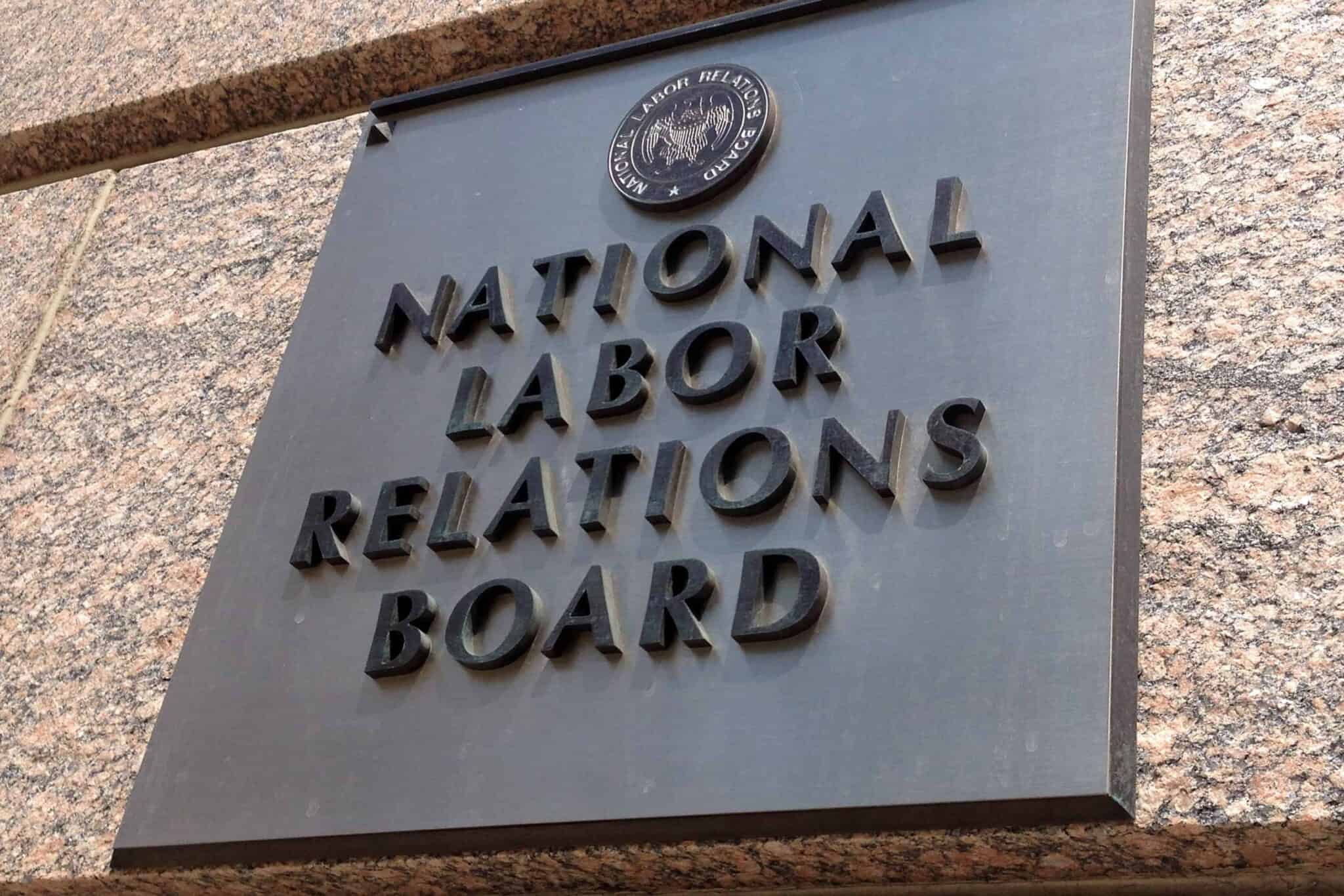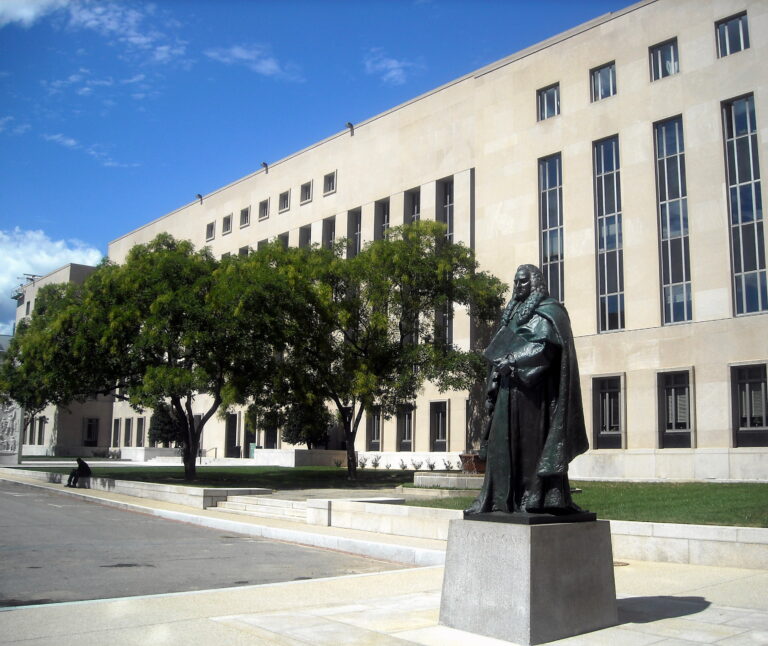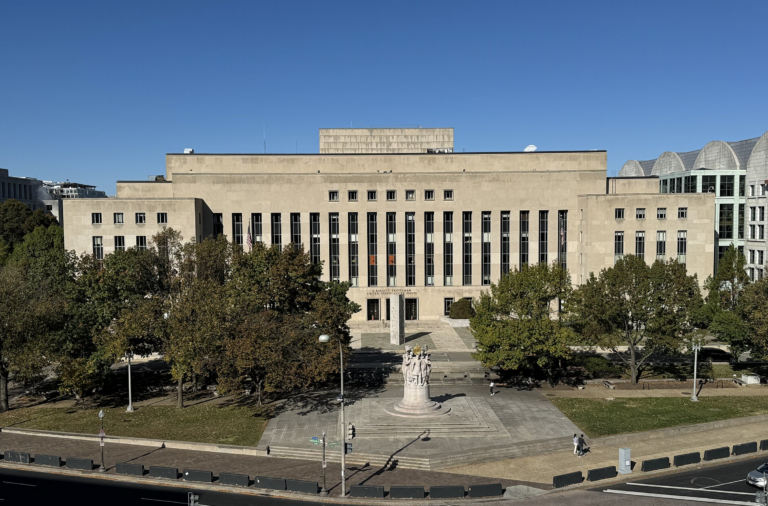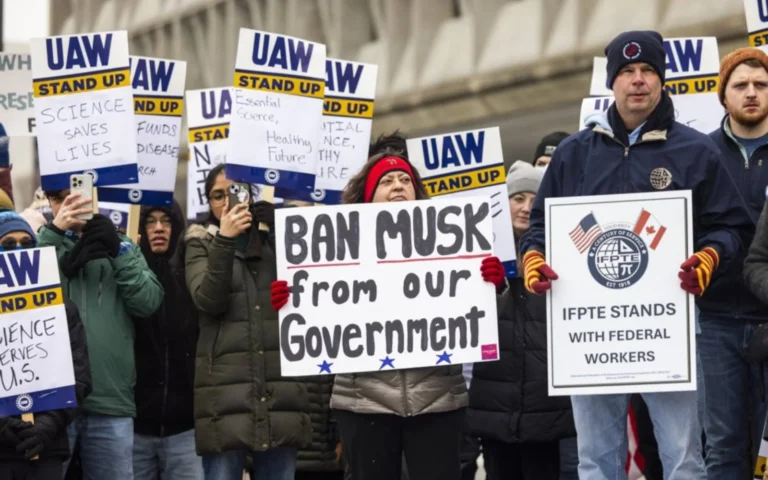
Andrew Strom is a union lawyer based in New York City. He is also an adjunct professor at Brooklyn Law School.
In recent weeks, two different Trump-appointed federal judges have issued injunctions to stop the National Labor Relations Board (NLRB) from conducting routine hearings against employers based on the absurd claim that the 90 year-old National Labor Relations Act (NLRA) is unconstitutional. This is a five-alarm fire and yet these outrageous power grabs have largely been met with a collective shrug.
Since Congress first passed the NLRA, cases alleging violations of the Act have been adjudicated the same way: one of the Board’s regional offices investigates a charge, and if the Regional Director determines that the charge has merit, the case is set for hearing before a civil servant. Since 1972 these hearing officers have been referred to as Administrative Law Judges (ALJs). Any decision issued by an ALJ may be appealed to the five Board Members, who are appointed by the President in staggered terms. Each year the NLRB holds hundreds of hearings before ALJs, and issues hundreds of decisions finding that employers or unions committed unfair labor practices. The Supreme Court has ruled on hundreds of cases involving the NLRB, and the Courts of Appeals have ruled on thousands. Yet, now, as Justice Kagan might say, “some geniuses” have decided that the entire NLRA is unconstitutional. To be precise, these “geniuses” are two Trump-appointed district court judges in Texas, a state covered by the notorious Fifth Circuit Court of Appeals.
The Texas twosome are Alan Albright and Jeffrey Vincent Brown, and their theory for why the NLRA is unconstitutional is that the ALJs who oversee hearings are improperly insulated from removal by the President. On July 23rd and July 29th, Albright and Brown issued rulings enjoining the NLRB from holding unfair labor practice proceedings against two different employers – SpaceX and Energy Transfer, a natural gas pipeline operator. The lead lawyer for SpaceX is Harry Johnson, who served as a Member of the NLRB for two years, and apparently never realized during that time that he was acting in a lawless manner. SpaceX and Energy Transfer have argued that the structure of the NLRB is unconstitutional because ALJs are officers in the Executive branch, and Article II of the Constitution requires that all executive officers must be subject to removal by the President.
So, in other words, Elon Musk is arguing that his company will be injured if it is subject to an adjudicatory hearing before an official who cannot be summarily fired by President Biden. How does SpaceX even have standing to make this argument? Is there any evidence that President Biden wants to fire any of the Board’s ALJs? And, isn’t the standard complaint from the business lobby that the NLRB is too political? The same firm that represents Energy Transfer made this exact argument in asking the Supreme Court to overrule Chevron. There it argued that the Board “continuously realign[s] federal labor law with its vacillating political views.”
Judges Albright and Brown insist that they are simply applying Fifth Circuit precedent, and that’s at least close to the truth. In 2022, in Jarkesy v. Securities and Exchange Commission, a divided Fifth Circuit panel held that the SEC enforcement scheme was unconstitutional in three different respects as applied to Jarkesy. The panel held Jarkesy was entitled to a jury trial; Congress failed to provide an intelligible principle by which the SEC may decide whether to bring an enforcement action in court or before an ALJ; and the SEC ALJs were improperly insulated from removal by the President. This Term, the Supreme Court affirmed the Fifth Circuit on the first of those grounds, remaining silent on the other two.
The Fifth Circuit’s ruling in Jarkesy was a massive overreach. The panel majority claimed to be applying the Supreme Court’s opinion in Free Enterprise Fund v. Public Co. Accounting Oversight Bd., but in fact, the panel extended Free Enterprise Fund in a direction that the Supreme Court disavowed. Free Enterprise Fund involved an entity created by Congress as a private nonprofit corporation, whose five members were appointed by the SEC, and could only be removed by the SEC for “good cause.” This entity – the Public Company Accounting Oversight Board, was given expansive powers to promulgate auditing and ethics standards, and to perform inspections of accounting firms. The Board had power to permanently revoke a firm’s registration, to permanently ban individuals from associating with any registered firm, and to impose penalties of up to $15 million on firms. In a 5-4 ruling, the Court held that this structure was unconstitutional because the Oversight Board’s members exercised executive functions, and their double insulation from removal by the President improperly undermined the President’s constitutional authority to “take care that the laws be faithfully executed.” Justice Breyer’s dissent pointed out that neither text nor history answered the question before the Court, and he made a compelling case for why the Court majority was wrong. But, more importantly, the majority conceded that it was not addressing the status of administrative law judges, noting that many ALJs “perform adjudicative rather than enforcement or policymaking functions, or possess purely recommendatory powers.” The Fifth Circuit also failed to acknowledge the Supreme Court’s opinion in Collins v. Yellen, where the Court held that an unconstitutional removal provision doesn’t necessarily taint the government’s action where the officials were lawfully appointed.
At least in Jarkesy, the Fifth Circuit was reviewing agency action that had already taken place. These two district court decisions are even more outrageous because they stop the NLRB in its tracks before there has even been an ALJ hearing. The theory here is that if the NLRB is allowed to move forward, Energy Transfer and SpaceX will suffer irreparable harm because they would be “subjected to unconstitutional agency authority – a proceeding before an unaccountable ALJ.” We are really through the looking glass here. These companies are suggesting that they are injured because President Biden doesn’t have the authority to fire the ALJs if the ALJs issue a decision he doesn’t like, but you know that if the President Biden did have authority to fire ALJs without cause, they would argue that they couldn’t possibly get a fair hearing. At any rate, Congress included a severability clause in the NLRA, making it clear that instead of shutting down the NLRB proceedings, the district court judges should have at most issued narrow orders stripping the civil service protections from the ALJs who hear these cases.
These two cases are part of a broader right-wing movement to destroy administrative agencies and return to the days of the robber barons. As SpaceX’s own lawyer once said, the NLRA “is of vital importance” because “we don’t want to wake up and live in a United States of America … where you have a bunch of oligarchic plutocrats on the one hand and serfs on the other hand and that’s it.” It’s time to sound the alarm.








Daily News & Commentary
Start your day with our roundup of the latest labor developments. See all
April 2
Local academic unions face pushback in negotiations
April 1
In today’s news and commentary, Aramark workers at Philly stadiums reach tentative agreement, Crystal Carey is poised to take general counsel at NLRB, President Trump’s nominees for key DOL positions, and the National Treasury Employees Union sues the Trump administration. UNITE HERE Local 274, which represents thousands of food service workers in the Philadelphia region, […]
March 31
Trump signs executive order; Appeals court rules on NLRB firing; Farmworker activist detained by ICE.
March 28
In today’s news and commentary, Wyoming bans non-compete agreements, rideshare drivers demonstrate to recoup stolen wages, and Hollywood trade group names a new president. Starting July 1, employers will no longer be able to force Wyoming employees to sign non-compete agreements. A bill banning the practice passed the Wyoming legislature this past session, with legislators […]
March 27
Florida legislature proposes deregulation of child labor laws, Trump administration cuts international programs that target child labor and human trafficking, and California Federal judge reversed course and ruled that unions representing federal employees can sue the Trump administration over mass firings.
March 25
Illinois warehouse quota bill vetoed; Minnesota residents organize; circuit split on NLRB deference continues